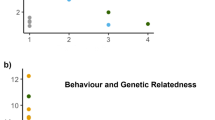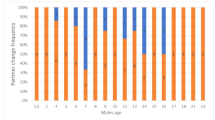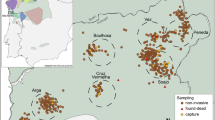Abstract
POSTPONEMENT of dispersal and breeding to assist in rearing others' young may be favoured if helpers' contributions to the production of close kin exceed their likely reproductive success had they dispersed1,2. Young adult stripe-backed wrens (Campylo-rhynchus nuchalis) remain in natal groups and greatly enhance reproductive success of close kin. Long-term behavioural observations suggest that only the dominant male and female in a group breed3; however, extra-pair parentage has been confirmed biochemically in apparently monogamous birds4,5, including some social species6,7. DNA fingerprinting of wren groups shows that behaviourally dominant males sometimes share paternity with auxiliary males previously thought to be nonproductive, whereas dominants are the only reproductives among females. Reproduction by auxiliary males (but not females) helps explain the long tenure of males in helper status and the contrasting combativeness of females in competition for breeding positions outside the natal group8,9, but reproduction by auxiliaries cannot alone explain helping behaviour.
This is a preview of subscription content, access via your institution
Access options
Subscribe to this journal
Receive 51 print issues and online access
$199.00 per year
only $3.90 per issue
Buy this article
- Purchase on Springer Link
- Instant access to full article PDF
Prices may be subject to local taxes which are calculated during checkout
Similar content being viewed by others
References
Brown, J. L. Helping and Communal Breeding in Birds (Princeton University Press, Princeton, New Jersey, 1987).
Hamilton, W. D. J. theor. Biol. 7, 1–72 (1964).
Rabenold, K. N. Behavl. Ecol. Sociobiol. 17, 1–17 (1985).
Gowaty, P. A. & Karlin, A. A. Behavl. Ecol. Sociobiol. 15, 91–95 (1984).
Westneat, D. F. Behavl. Ecol. Sociobiol. 27, 67–76 (1990).
Wrege, P. H. & Emlen, S. T. Behavl. Ecol. Sociobiol. 20, 153–160 (1987).
Burke, T., Davies, N. B., Bruford, M. W. & Hatchwell, B. J. Nature 338, 249–251 (1989).
Rabenold, K. N. in Cooperative Breeding in Birds: Long-term Studies of Ecology and Behaviour (eds Stacey, P. B. & Koenig, W. D.) 157–196 (Cambridge University Press, London, 1990).
Zack, S. W. & Rabenold, K. N. Anim. Behav. 38, 235–247 (1989).
Jeffreys, A. J., Wilson, V. & Thein, S. L. Nature 314, 67–73 (1985).
Grafen, A. Anim. Behav. 35, 462–467 (1987).
Jeffreys, A. J., Royle, N. J., Wilson, V. & Wong, Z. Nature 332, 278–281 (1988).
Burke, T. & Bruford, M. W. Nature 327, 149–152 (1987).
Rabenold, P. P., Piper, W. H., Decker, M. D. & Minchella, D. J. Genome (in the press).
Jeffreys, A. J., Brookfield, J. F. Y. & Semeonoff, R. Nature 317, 818–819 (1985).
Author information
Authors and Affiliations
Rights and permissions
About this article
Cite this article
Rabenold, P., Rabenold, K., Piper, W. et al. Shared paternity revealed by genetic analysis in cooperatively breeding tropical wrens. Nature 348, 538–540 (1990). https://doi.org/10.1038/348538a0
Received:
Accepted:
Issue Date:
DOI: https://doi.org/10.1038/348538a0
This article is cited by
-
Male-male competition is not costly to dominant males in a cooperatively breeding bird
Behavioral Ecology and Sociobiology (2015)
-
Multiple paternity in the cooperatively breeding fish Neolamprologus pulcher
Behavioral Ecology and Sociobiology (2008)
-
Local genetic structure within two rookeries of Chelonia mydas (the green turtle)
Heredity (1996)
-
Elternschaftsnachweise bei TrauerschnäppernFicedula hypoleuca am Westrand ihres mitteleuropäischen Verbreitungsareals
Journal für Ornithologie (1996)
Comments
By submitting a comment you agree to abide by our Terms and Community Guidelines. If you find something abusive or that does not comply with our terms or guidelines please flag it as inappropriate.



